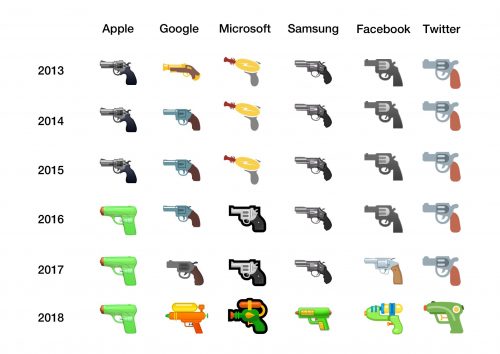Major policy issues like gun control often require massive social and institutional changes, but many of these issues also have underlying cultural assumptions that make the status quo seem normal. By following smaller changes in the way people think about issues, we can see gradual adjustments in our culture that ultimately make the big changes more plausible.

For example, today’s gun debate even drills down to the little cartoons on your phone. There’s a whole process for proposing and reviewing new emoji, but different platforms have their own control over how they design the cartoons in coordination with the formal standards. Last week, Twitter pointed me to a recent report from Emojipedia about platform updates to the contested “pistol” emoji, moving from a cartoon revolver to a water pistol:
In an update to the original post, all major vendors have committed to this design change for “cross-platform compatibility.”
There are a couple ways to look at this change from a sociological angle. You could tell a story about change from the bottom-up, through social movements like the March For Our Lives, calling for gun reform in the wake of mass shootings. These movements are drawing attention to the way guns permeate American culture, and their public visibility makes smaller choices about the representation of guns more contentious. Apple didn’t comment directly on the intentions behind the redesign when it came out, but it has weighed in on the politics of emoji design in the past.
You could also tell a story about change from the top-down, where large tech companies have looked to copy Apple’s innovation for consistency in a contentious and uncertain political climate (sociologists call this “institutional isomorphism”). In the diagram, you can see how Apple’s early redesign provided an alternative framework for other companies to take up later on, just like Google and Microsoft adopted the dominant pistol design in earlier years.
Either way, if you favor common sense gun reform, redesigning emojis is obviously not enough. But cases like this help us understand how larger shifts in social norms are made up of many smaller changes that challenge the status quo.
Evan Stewart is an assistant professor of sociology at University of Massachusetts Boston. You can follow his work at his website, or on BlueSky.
Comments 11
Pocket-sized Politics | Yellowos — February 28, 2019
[…] (View original at https://thesocietypages.org/socimages) […]
Jason Boo — September 1, 2019
Your site seems very useful, it's a pity that I find out about it only now, because, when I was in college, I have big problems with mathematics... I want to share a good resource, which also helps students with homework assignments, it's https://payforessay.net/ , check it.
Eileen J Murray — October 11, 2021
Hello, Can you please explain more about the social image, I want to know more about it? By the way, Have you guys ever tried a game of poker? If no then visit bonus catch now and I can find the best information regarding it.
adoptbadger — June 30, 2022
I have a lot of trouble with mathematical concepts... I would like to recommend a useful resource to you, octordle which also assists students with the completion of their assigned homework. Please check it out.
Hannah — August 20, 2022
Graj darmowe gry dla dziewczyn teraz.
Toni Waller — November 28, 2022
I struggle a lot with mathematical ideas. I would like to suggest a helpful website geometry dash to you that also helps pupils do their given schoolwork.
Lee Collier — February 24, 2025
Changes in gun design have a lot of meaning for people’s perceptions. Explore the racetrack and take on the obstacles that prove your bravery in geometry dash subzero.
kasif sofeyn kasan — July 24, 2025
I actually enjoy the posting. It usually is wonderful to evaluate any one demonstrate around thoughts in the cardiac coupled with lucidity in this significant dilemma can be immediately found. 비아그라 구매
kashif kashif kashif — August 9, 2025
The looks definitely splendid. Everyone of these dwarf tips can be fabricated by using lots of records go through. I want everything you need noticeably. helloworld翻译
geometry — October 22, 2025
Geometry dash subzero is a brand-new game from the Geometry Dash series that features three difficult and distinctive levels. Prepare for the temperature drop!
fiddlebops — November 15, 2025
You don’t need fancy graphics to have fun — Football Bros IO proves that gameplay and competition are what really matter.